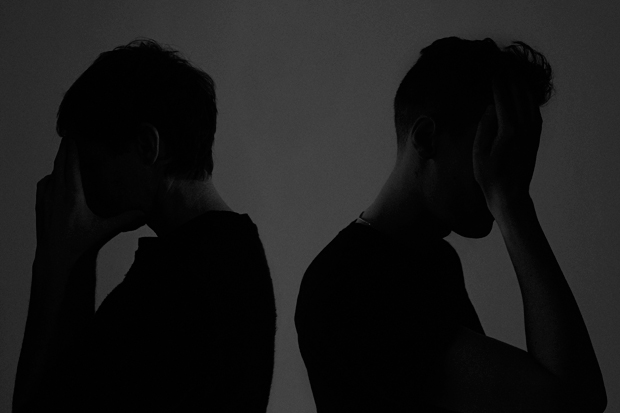Release Date: March 05, 2013
Label: Universal Republic
For a few months, Rhye kept nearly everyone guessing. And fantasizing. Bloggers and DJs alike were enchanted by languid, sublimely beguiling singles from this initially anonymous entity: On “The Fall,” restless piano chords seemingly borrowed from a Chicago house jam danced atop chamber strings, gentle brush strokes, blunted bass bumps, and a sighing vocalist who conjures comparisons to Sade and Tracey Thorn. “Oooooooh, make love to me,” the soft voice cried. “Why can’t you stay?” A good question: Who would abandon someone with a voice this seductive?
The faceless, fragmented body parts that serve as artwork for “Open,” “The Fall,” and now the full-length Woman may be female, but Rhye’s coo has been revealed to be a man’s: Toronto’s Michael Milosh, who together with Copenhagen’s Robin Hannibal comprises the currently Los Angeles-based duo. Both had released records on the city’s Plug Research label, the singer’s under his last name, and Hannibal’s in collaboration with vocalist Coco as Quadron. And both had begun new relationships; Milosh soon married the young woman he sings to in the early video to “Open.” He credits her as “my muse” on Woman, the kind of album that can only be made in the feverish early stages of all-consuming eroticism and adoration.
In their previous projects, both these musicians fortified their soft soul. Milosh combined it with glitchy synths; Quadron mixed in funk quirks. Here, they luxuriate in it: Milosh’s contralto cry soars over finely detailed strings, woodwinds, horns, and harp, while guitarists conjure both the hushed plucking of ’80s sophisti-pop and the reverbed haze of early 4AD. Sometimes, there is muted disco: When it aligns with Milosh’s tendency to sustain wordless vowels in swoopy swoons, delicate groove cuts like “Hunger” seem poised to segue into Andrea True Connection’s orgasmic “More, More, More.” But mostly there are ballads — exquisitely poised, expertly arranged ones so dialed into their feminine inspirations that Milosh and Hannibal virtually merge with the objects of their affection.
The result ranks among pop’s most convincing feats of gender bending, served up with a side dish of racial blurring. Unlike, say, Antony Hegarty or Grace Jones, Rhye de-emphasize visuals to the point of near-invisibility. For their recent performance at L.A.’s Boiler Room, the lushly augmented pair performed by candlelight and a neon sign that backlit Milosh’s head in face-obscuring silhouette. Before then, nearly every admiring critic (even Perez Hilton!) thought Milosh was female. Even now, it’s still hard not to imagine a Sade-like siren — perhaps white, perhaps black — singing these songs. To find a male singer more audibly feminine, you’d have to go back to “Little” Jimmy Scott, the African-American jazz singer born with a medical condition that prevented him from achieving puberty.
In their tenderness, Rhye similarly recall the falsetto Philly soul of the Delfonics, the Stylistics, Blue Magic, and other male harmony groups of the late ’60s and early ’70s. Place Milosh in a tradition of cool jazz crooners like Chet Baker, Mose Allison, and Michael Franks — as well as subsequent AOR smoothies likely influenced by them, from Michael McDonald to Sting — and you’ll hear him as what he is: the latest in a long line of high-voiced white guys who adore and aspire to the prettiest soul. Otherwise, he still suggests an ethnically ambiguous “she.”
In the decades between the debuts of Prince and Frank Ocean, R&B has taken its cues from hip-hop, which opened its doors to female MCs tough enough to hang with the guys, but didn’t exactly welcome much gender fluidity on the male side. According to Milosh, the initial secrecy over the band’s background and continued obfuscation of their physicality reflect a desire to emphasize their music, not their image or identity. This is admirable, but it’s also notable that only one gender-specific noun appears on the pointedly feminine Woman — otherwise, there’s only baby‘s and dear‘s and you‘s — and that appears on the final track, which features an overdubbed choir of Miloshes sweetly singing nothing but the album’s title. Not only does this come across as a feminist statement, but it also plays like a declaration of Sapphic love: an unlikely achievement from two dudes expressing hetero desire.
Gender-neutral love songs aren’t the sole providence of gay folk, but from Pete Shelley of the Buzzcocks to Romy Madley Croft and Oliver Sim of the xx, they’ve allowed LGBT rockers to write and sing universally, without lying, while minimizing the likelihood that their sexual orientation will dictate the reception of their work. Here they enable Milosh to not, until the last song, be perceived as a lesbian. Not that Rhye are totally femme. Their enraptured lyrics sometimes get savage, like on “3 Days,” which describes a consensual sex binge in bloody sheets: “I’m killing you,” Milosh murmurs with a poeticism that evokes Shakespearian sonnets, not Chris Brown. These are words that would not fly with the slightest hint of malice or machismo, or realism, for that matter: Woman concerns itself with the otherworldliness of love, and how it allows us to trust another human so mutually and thoroughly that divisions between skin and sex — and even life and death — break down.
Female musicians still fight to gain entry to the largely masculine grounds of rock and hip-hop, and sometimes do so by blending with the boys, but it’s rare that men, let alone heterosexual ones, lose themselves so thoroughly within a womanly musical sphere. For Rhye, that’s a transatlantic art-house impression of quiet storm soul, perhaps the only emphatically adult genre where what’s feminine remains privileged. Woman is likely too European to fly with the same African-American audience that decades ago embraced Teena Marie as their own. Yet Rhye nevertheless transcend gender while bypassing drag the way Lady Tee circumvented blackface. They do so with devotion.





